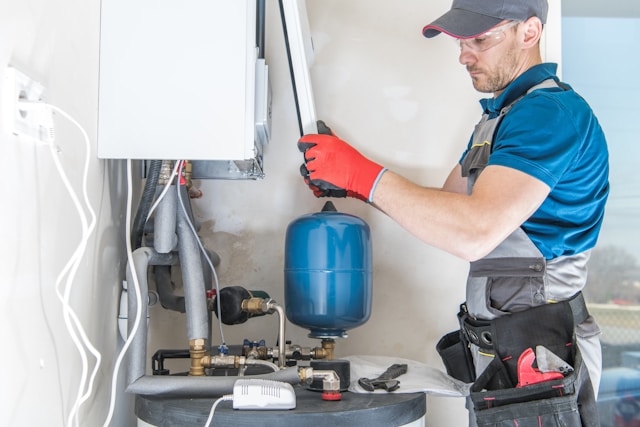Plumbing emergencies can happen at any time and often require quick action to prevent extensive damage to your home. Knowing what to do in the first critical moments can make a significant difference in minimizing water damage and repair costs. Here’s a guide to handling common plumbing emergencies until the plumber arrives.
1. Burst Pipes
What to Do:
- Turn Off the Main Water Supply: Locate and shut off the main water valve to stop the flow of water.
- Drain the Pipes: Open all faucets to empty the water remaining in the pipes.
- Contain the Water: Use buckets or towels to soak up water and reduce damage.
- Call a Plumber: This is a serious issue that requires professional attention.
Prevention Tip:
- Insulate exposed pipes during winter to prevent freezing and bursting.
2. Overflowing Toilets
What to Do:
- Turn Off the Water Supply: Locate the shut-off valve behind the toilet and turn it clockwise.
- Clear the Blockage: Use a plunger to try and dislodge the clog. Avoid flushing repeatedly, as this can worsen the overflow.
- Disinfect the Area: Clean the affected area thoroughly to prevent bacterial contamination.
Prevention Tip:
- Avoid flushing non-flushable items like wipes, feminine hygiene products, or excessive toilet paper.
3. Leaking Water Heater
What to Do:
- Turn Off the Water Heater: Switch off the power supply (electricity or gas) to the water heater to prevent overheating or further leaks.
- Shut Off the Water Supply: Turn off the valve on the cold water pipe leading into the water heater.
- Drain the Tank (If Necessary): If the leak is severe, drain the water heater to prevent flooding.
Prevention Tip:
- Schedule regular maintenance to check for sediment buildup or signs of corrosion.
4. Clogged Sinks or Drains
What to Do:
- Avoid Chemical Drain Cleaners: These can damage your pipes if overused.
- Use a Plunger: Create a seal and apply pressure to dislodge the clog.
- Try a Drain Snake: For stubborn clogs, use a drain snake to break up debris.
Prevention Tip:
- Use strainers to catch debris in sinks and regularly flush drains with hot water to prevent buildup.
5. Sewer Line Backups
What to Do:
- Stop Using Water: Avoid flushing toilets or running water in sinks to prevent more waste from backing up.
- Block Off the Area: Keep family members and pets away from the affected area to prevent contamination.
- Call a Professional Plumber: Sewer line backups require immediate professional assistance.
Prevention Tip:
- Schedule regular sewer line inspections and avoid flushing grease, oil, or non-biodegradable items down the drain.
6. Broken Faucets or Fixtures
What to Do:
- Shut Off the Water Supply: Turn off the valve under the sink or the main water supply.
- Contain Leaks: Place a bucket under the leak to catch water until a plumber can fix the issue.
Prevention Tip:
- Regularly check faucets and fixtures for wear and replace parts as needed.
7. Gas Line Leaks (From Water Heaters or Appliances)
What to Do:
- Turn Off the Gas Supply: Locate the gas shut-off valve and turn it off.
- Ventilate the Area: Open windows and doors to let gas escape.
- Evacuate Immediately: Leave the home and call emergency services or a licensed plumber specializing in gas lines.
Prevention Tip:
- Install gas detectors and schedule regular inspections of gas lines and appliances.
General Tips for Any Plumbing Emergency
- Know the Location of Shut-Off Valves: Familiarize yourself with the main water shut-off valve and individual fixture valves.
- Keep Emergency Tools Handy: Have a plunger, adjustable wrench, bucket, and towels accessible for quick action.
- Maintain a List of Emergency Contacts: Keep the contact information of a reliable local plumber readily available.
When to Call a Professional Plumber
While you can take immediate steps to manage plumbing emergencies, professional intervention is often necessary to ensure a long-term solution. Call a licensed plumber if:
- You cannot locate the source of the problem.
- DIY methods are ineffective.
- The issue involves gas lines or sewer backups.
Conclusion
Plumbing emergencies can be stressful, but knowing how to respond quickly and effectively can minimize damage and keep your home safe. By taking preventive measures and having an action plan in place, you’ll be better prepared to handle any plumbing crisis.
If you’re ever unsure about a plumbing issue, it’s best to err on the side of caution and consult a professional. Acting quickly and responsibly can save you time, money, and headaches in the long run.
